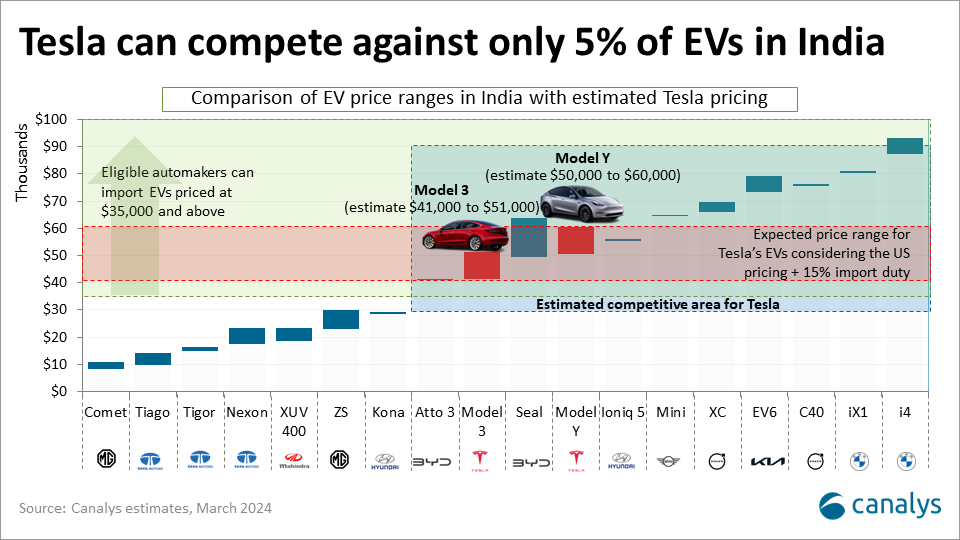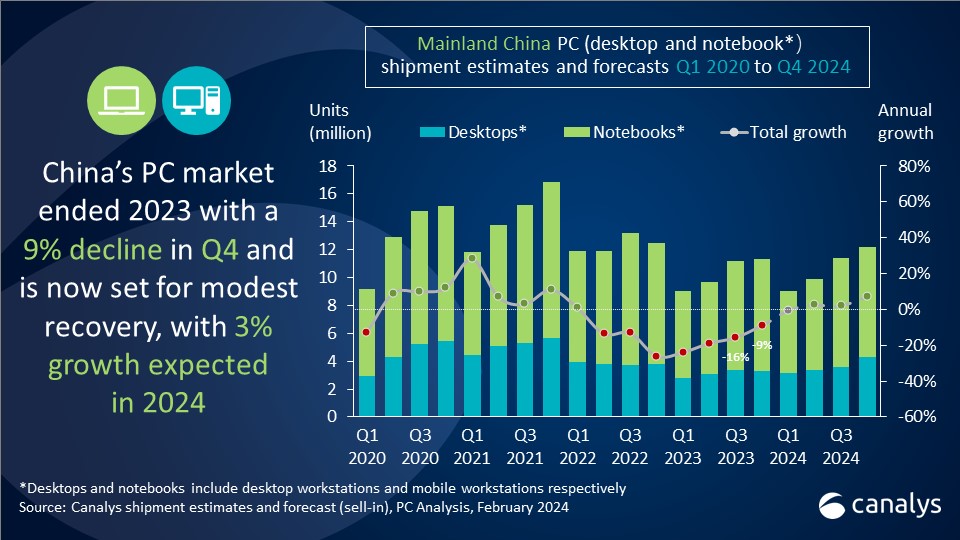Canalys is part of Informa PLC
This site is operated by a business or businesses owned by Informa PLC and all copyright resides with them. Informa PLC’s registered office is 5 Howick Place, London SW1P 1WG. Registered in England and Wales. Number 8860726.

Cultivating success: chipmakers in China's automotive chipset market
Chinese chipmakers are on the rise, with Horizon Robotics and Axera leading the ADAS SoC market. Collaborations and strategic initiatives beyond the core system-level SoCs are shaping China's automotive chipset industry, paving the way for global growth opportunities and partnerships that showcase the country's competitive edge in the chip market.


In 2023, according to Canalys estimates, the penetration rate of L2 and above ADAS SoCs from Chinese chipmakers exceeded 8% in China, with a potential for further growth. Some Chinese SoC vendors have established a strong reputation, as automotive OEMs and tier-one suppliers prioritize SoC vendors' comprehensive capability.
In the recently released Canalys China ADAS SoC Vendor Leadership Matrix, two Chinese SoC vendors, Horizon Robotics and Axera were crowned champions. Additionally, four Chinese SoC vendors, Black Sesame Technologies, HOUMO.AI, Novauto and EVAS Intelligence were recognized as Scalers. Close collaboration between industry players and governmental agencies aims to enhance the broader Chinese automotive chipset market environment beyond the core system-level SoCs.
New policies outline China's automotive chipset industry development framework
The National Automotive Chip Standard System Construction Guide published by China's Ministry of Industry and Information Technology (MIIT) in January 2024 underscores the importance of establishing standards to drive industry development and proposes specific construction goals and implementation strategies:
- Emphasizes the openness and compatibility of China's automotive chipset standard system and aligns it with international and domestic development trends, aiming to establish an international standard.
- Highlights the importance of comprehensively addressing typical automotive chip application scenarios and testing methods while identifying key development directions and priority areas.
These measures are expected to profoundly impact the automotive market, driving the development of China’s automotive chip industry and setting a benchmark for global automotive chip standards. As the automotive industry accelerates the transition to electric and intelligent electric vehicles, the demand for automotive chips will continue to grow.
Chinese automotive chipsets need validation both domestically and internationally
Chinese OEMs are increasingly recognizing the importance of homegrown chips as a pivotal component in their product strategies, thus ramping up investments and strategic positioning in chipset R&D and manufacturing. OEMs primarily follow three main operational models based on the control preferences over different types of chips and return on investment targets.
- In-house research: select OEMs develop chipsets independently to maintain stronger control over crucial chipsets, such as BYD, Geely's ECARX, NIO and Li Auto.
- Investing and incubating startups: OEMs like SAIC Motor choose to invest in semiconductor startups.
- Establishing joint ventures with chipset companies: SAIC and Infineon, as well as GAC and Zhuzhou CRRC Times Electric established joint ventures (JVs) to produce IGBTs. Li Auto and Sanan Semiconductor jointly develop silicon carbide semiconductors.
The joint venture serves to meet OEMs’ requirements most effectively by both strengthening the domestic market requirements and reinforcing their global expansion efforts by ensuring a steady supply capacity.
Chinese carmakers’ global expansion is one of chipmakers' best routes to market
Chinese automotive chipset vendors are at a pivotal juncture, where their capabilities and potential for sustained growth need robust validation through market performance. Strategic collaboration with partners such as Chinese-led JVs, Chinese-owned foreign auto brands and European OEMs with empowered Chinese divisions is key to this validation. These partnerships provide vital platforms for domestic chip manufacturers to showcase their cutting-edge offerings and competitive edge to global suppliers and OEMs.
With fast-tracked global ambitions, Chinese OEMs are gaining prominence in the international automotive arena. Collaborations between local chip vendors and global vendors hold the promise of tackling critical challenges related to chip and data security for Chinese OEMs. Moreover, these collaborations serve as catalysts for showcasing the capabilities of Chinese chips across the globe.
The steps mentioned above are essential for facilitating the systematic globalization of the Chinese automotive industry, covering both vehicles and components. In addition to ensuring the stability of Chinese OEMs' exports and overseas production, it is critical to tap into the global carmakers' addressable market potential to ensure the stable long-term development of the Chinese chip supply chain.
Global chipmakers must recognize the rise of China’s automotive chipset industry
Global chipset vendors need to concentrate on two key areas to bolster their competitive edge in China - product planning and business model innovation. This entails enhancing product competitiveness and fostering stronger relationships with ecosystem players, capitalizing on the expanding export capabilities of automotive JVs in China. International chipmakers should leverage their established solutions and R&D expertise in China, alongside their global capabilities, to fortify partnerships with overseas OEM partners.
It is important for global chipset vendors to integrate more deeply with China's automotive ecosystems, rather than just trying to maintain competitiveness through defensive strategies. They need to acknowledge China's commitment to openness and global compatibility, on top of its strong interests in building self-sufficiencies for automotive chipsets. Companies that participate actively in developing China's chipset ecosystem through investments, joint ventures or creating localized chip companies, will have a competitive edge as China's ecosystem matures.
In conclusion, proactive adaptation and strategic alignment with evolving market trends are essential for global chipset vendors to navigate the dynamic landscape of China's automotive chipset industry and capitalize on its growth opportunities.







